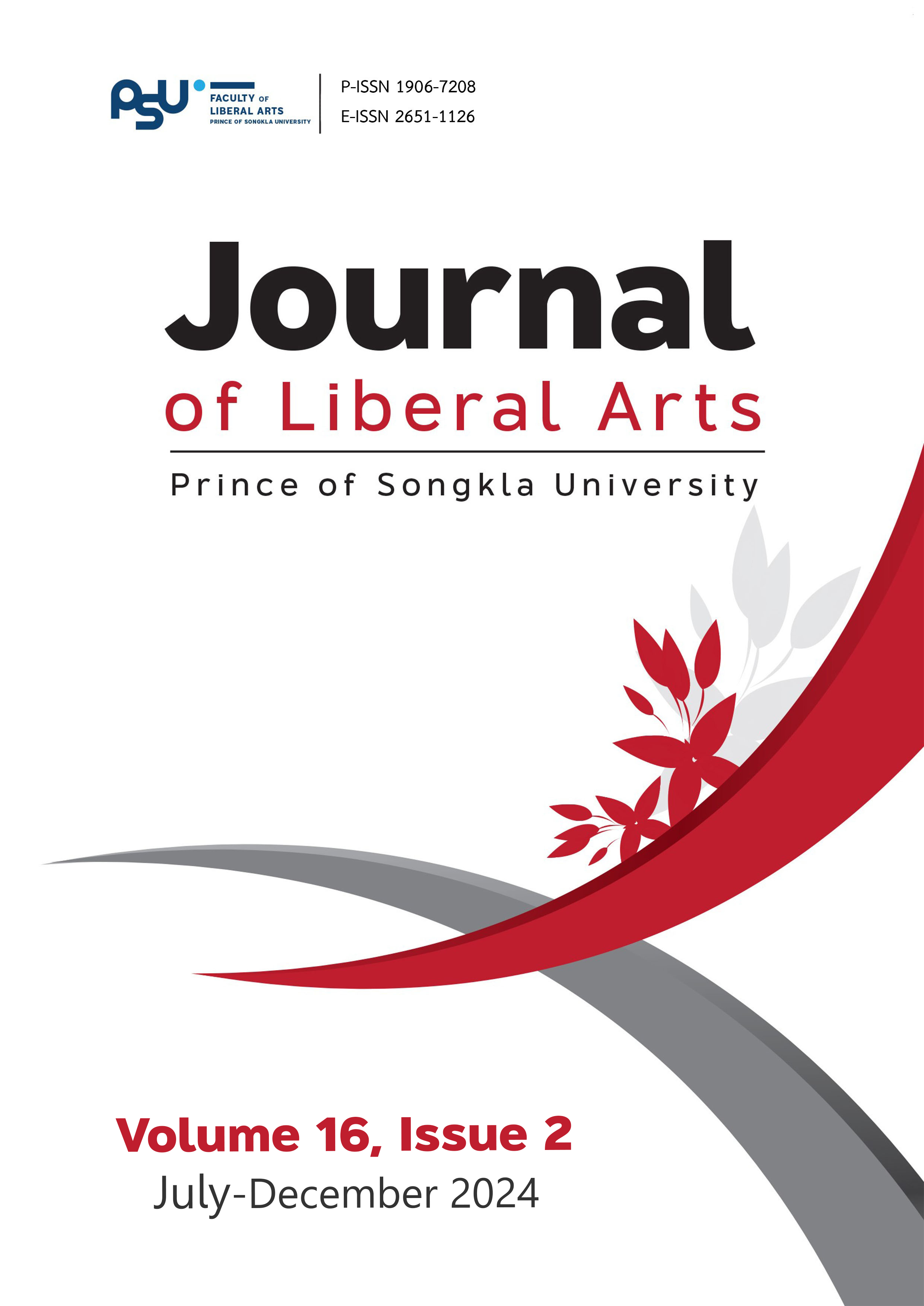การใช้กิจกรรมการเรียนภาษาอังกฤษที่บ้านเพื่อเพิ่มการมีส่วนร่วมของผู้ปกครองไทยที่มีทักษะภาษาอังกฤษจำกัด
DOI:
https://doi.org/10.14456/jlapsu.2024.16คำสำคัญ:
ผู้ปกครองไทย, ผู้ปกครองที่มีทักษะภาษาอังกฤษจำกัด , กิจกรรมการเรียนภาษาอังกฤษที่บ้าน , การมีส่วนร่วมของผู้ปกครอง , ภาษาอังกฤษเป็นภาษาต่างประเทศบทคัดย่อ
การมีส่วนร่วมของผู้ปกครองในการส่งเสริมการเรียนที่บ้านมีบทบาทสำคัญต่อการพัฒนาภาษาอังกฤษของเด็กที่เรียนภาษาอังกฤษเป็นภาษาต่างประเทศ อย่างไรก็ตาม ผู้ปกครองที่มีทักษะภาษาอังกฤษจำกัดมักประสบปัญหาในการส่งเสริมบุตรหลานของตน ซึ่งอาจส่งผลให้โอกาสในการพัฒนาทักษะภาษาอังกฤษของบุตรหลานลดลง การศึกษาครั้งนี้มีวัตถุประสงค์ เพื่อเพิ่มการมีส่วนร่วมของผู้ปกครองไทยที่มีทักษะภาษาอังกฤษจำกัดในการส่งเสริมการเรียนรู้ภาษาอังกฤษของบุตรหลานที่บ้านโดยใช้ชุดกิจกรรมการเรียนภาษาอังกฤษที่บ้าน การศึกษานี้ใช้รูปแบบวิจัยแบบผสมผสาน โดยวิธีการแบบกลุ่มเดียวทดสอบก่อนและหลังการศึกษา กลุ่มตัวอย่างเป็น ผู้ปกครองที่มีทักษะภาษาอังกฤษจำกัดและมีบุตรหลานเรียนในโรงเรียนอนุบาลแห่งหนึ่งในภาคเหนือของประเทศ จำนวน 26 คน ได้มาจากการเลือกกลุ่มตัวอย่างแบบเจาะจง เครื่องมือวิจัยประกอบด้วยกิจกรรมการเรียนรู้ภาษาอังกฤษที่บ้าน 4 กิจกรรม ได้แก่การใช้วิดีโอนิทาน การใช้วิดีโอสอนคำศัพท์ การใช้บัตรภาพ และการอ่านหนังสือกับบุตรหลาน รวมทั้งแบบสอบถามก่อนและหลังการศึกษา และการสัมภาษณ์แบบกึ่งโครงสร้างเพื่อวัดความเปลี่ยนแปลงในวิธีการมีส่วนร่วมของผู้ปกครอง 3 รูปแบบได้แก่ การสอนทางอ้อม การให้การสนับสนุน และการให้กำลังใจ
ผลการศึกษาพบว่าผู้ปกครองมีส่วนร่วมมากขึ้นหลังการใช้ชุดกิจกรรมการเรียนรู้ภาษาอังกฤษที่บ้านอย่างมีนัยสำคัญจากปัจจัยสำคัญ 2 ประการ ได้แก่ (1) การใช้ชุดกิจกรรมทำให้ผู้ปกครองตระหนักถึงความสำคัญของการมีส่วนร่วมของตนเองและมีความมั่นใจในการส่งเสริมการเรียนรู้ที่บ้านมากขึ้น (2) กิจกรรมมีการออกแบบที่เหมาะสมกับผู้ปกครอง อย่างไรก็ตาม กิจกรรมที่ผู้ปกครองบางคนพบปัญหาคือ กิจกรรมการอ่านหนังสือกับบุตรหลาน งานวิจัยนี้ชี้ให้เห็นถึงแนวทางในการใช้กิจกรรมภาษาอังกฤษที่บ้านเพื่อช่วยให้ผู้ปกครองที่มีทักษะภาษาอังกฤษจำกัดมีส่วนร่วมในการพัฒนาทักษะภาษาอังกฤษของบุตรหลานมากขึ้น
เอกสารอ้างอิง
Alkharusi, H. (2022). A descriptive analysis and interpretation of data from Likert scales in educational and psychological research. Indian Journal of Psychology and Education, 12(2), 13-16.
Beck, I. L., McKeown, M. G., & Kucan, L. (2013). Bringing words to life: Robust vocabulary instruction. Guilford Press.
Branch, R. M. (2009). Instructional design: The ADDIE approach. Springer.
Choi, N., Kang, S., Cho, H. J., & Sheo, J. (2019). Promoting young children’s interest in learning English in EFL context: The role of mothers. Education Sciences, 9(1), 46. https://doi.org/10.3390/educsci9010046
Clément, R., & Baker, S. C. (2001). Measuring social aspects of L2 acquisition and use: Scale characteristics and administration. University of Ottawa.
Forey, G., Besser, S., & Sampson, N. (2016). Parental involvement in foreign language learning: The case of Hong Kong. Journal of Early Childhood Literacy, 16(3), 383-413. https://doi.org/10.1177/1468798415597469
Green, C. L., Walker, J. M., Hoover-Dempsey, K. V., & Sandler, H. M. (2007). Parents’ motivations for involvement in children’s education: An empirical test of a theoretical model of parental involvement. Journal of educational psychology, 99(3), 532. https://doi.org/10.1037/0022-0663.99.3.532
Hoover-Dempsey, K. V., & Sandler, H. M. (2005). Final performance report for OERI Grant# R305T010673: The social context of parental involvement: A path to enhanced achievement. http://hdl.handle.net/1803/7595
Hoover-Dempsey, K. V., Walker, J. M., Sandler, H. M., Whetsel, D., Green, C. L., Wilkins, A. S., & Closson, K. (2005). Why do parents become involved? Research findings and implications. The elementary school journal, 106(2), 105-130.
Huang, S. (2013). The use of literacy bags promotes parental involvement in Chinese children’s literacy learning in the English language. Language Teaching Research, 17(2), 251-268. https://doi.org/10.1177/136216881347595
Khamsuk, A., & Whanchit, W. (2021). Storytelling: An alternative home delivery of English vocabulary for preschoolers during COVID-19’s lockdown in southern Thailand. South African Journal of Childhood Education, 11(1), 1-13.
Lai, J., Ji, X. R., Joshi, R. M., & Zhao, J. (2024). Investigating parental beliefs and home literacy environment on Chinese kindergarteners’ English literacy and language skills. Early Childhood Education Journal, 52(1), 113-126. https://doi.org/10.1007/s10643022-01413-3
Lau, C., & Richards, B. (2021). Home literacy environment and children’s English language and literacy skills in Hong Kong. Frontiers in Psychology, 11, 569581. https://doi.org/10.3389/fpsyg.2020.569581
Lee, Y. (2010). Parents’ perceived roles and home practices in supporting Taiwanese children’s English language and literacy learning. English Teaching & Learning, 34(1), 1-53.
Liu, C. C., & Chung, K. K. H. (2023). Impacts of home literacy environment on children’s English language learning as a second language. European Journal of Psychology of Education, 39. 1421–1439. https://doi.org/10.1007/s10212-023-00745-x
Petchprasert, A. (2014). The Influence of Parents’ Backgrounds, Beliefs about English Learning, and a Dialogic Reading Program on Thai Kindergarteners’ English Lexical Development. English Language Teaching, 7(3), 50-62.
Tong, F., Zhang, H., Zhen, F., Irby, B. J., & Lara-Alecio, R. (2021). Supporting home literacy practices in promoting Chinese parents’ engagement in their children’s English education in low-SES families: an experimental study. International Journal of Educational Research, 109, https://doi.org/10.1016/j.ijer.2021.101816
Walker, J. M., Shenker, S. S., & Hoover-Dempsey, K. V. (2010). Why do parents become involved in their children’s education? Implications for school counselors. Professional school counseling, 14(1). https://doi.org/10.1177/2156759X1001400104
Webb, S., & Nation, P. (2017). How vocabulary is learned. Oxford University Press.
Whitaker, M.C. (2019). The Hoover-Dempsey and Sandler model of the parent involvement process. In S. Sheldon and T. Turner-Vorbeck (Eds.), The Wiley handbook of family, school, and community relationships in education (pp. 421-433). Hoboken, NJ: Wiley Press. https://doi.org/10.1002/9781119083054.ch20
Yeung, S. S., & King, R. B. (2016). Home literacy environment and English language and literacy skills among Chinese young children who learn English as a second language. Reading Psychology, 37(1), 92-120. https://doi.org/10.1080/02702711.2015.1009591
Zhang, X., Lau, C., & Su, Y. (2021). Home environment and development of English as a second/foreign language for young children in Asian contexts: A systematic review and meta-analysis. Early Education and Development, 34(1), 274-305. https://doi.org/10.1080/10409289.2021.1981065
ดาวน์โหลด
เผยแพร่แล้ว
รูปแบบการอ้างอิง
ฉบับ
ประเภทบทความ
สัญญาอนุญาต
ลิขสิทธิ์ (c) 2024 Poowadol Srimalee, Songsavan Worraarpakorn

อนุญาตภายใต้เงื่อนไข Creative Commons Attribution-NonCommercial-NoDerivatives 4.0 International License.
ลิขสิทธิ์บทความเป็นของผู้เขียน แต่วารสารศิลปศาสตร์ มหาวิทยาลัยสงขลานครินทร์ ขอสงวนสิทธิ์ในการเป็นผู้ตีพิมพ์เผยแพร่เป็นครั้งแรก






